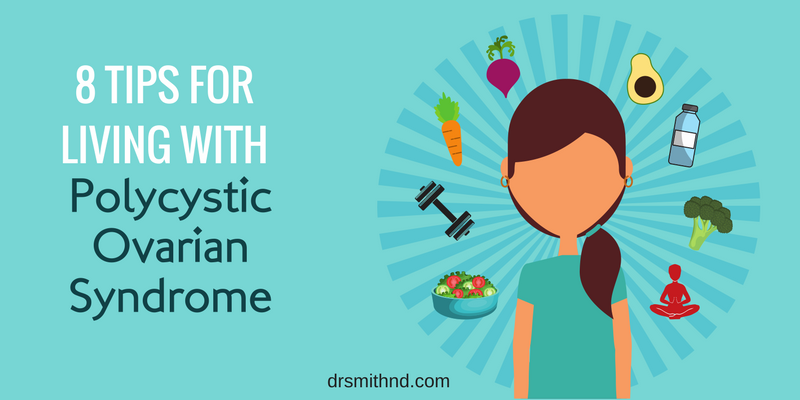Polycystic Ovarian Syndrome (PCOS) is a hormonal disorder that affects up to 10% of women worldwide. When left untreated, it can cause health complications and uncomfortable symptoms, such as weight gain, hairloss, acne, irregular menstruation and sometimes, fertility challenges. While no cure exists for it yet, there are natural treatments that help decrease symptoms.
What Exactly Is Polycystic Ovarian Syndrome?
Due to how very common Polycystic Ovarian Syndrome is, it is something I treat every single day. The syndrome results in the ovaries producing higher than normal amounts of androgens (i.e testosterones), which interfere with egg production, increase blood sugar and can lead to various other health concerns.
Despite the name, ovarian cysts aren’t necessary to make a diagnosis; sometimes they are there, sometimes they are not, but if the patient has a collection of a few of these symptoms listed below, they are likely to be diagnosed with Polycystic Ovarian Syndrome.
Doctors are screening for the most common collection of signs and symptoms including weight gain, infrequent or irregular menstruation, hair loss, infertility and excess hair growth on the face, breasts, abdomen (called hirsutism). Additionally, there is blood work and imaging we can do that can also capture some of the hormonal perturbances that match the symptoms.
One of the core challenges with PCOS as mentioned above is that it causes escalating blood sugar levels due to causing insulin resistance, which means weight issues. It’s the complex interplay between the sex hormones and the blood sugar imbalance that is ultimately responsible for the variety of symptoms women may experience.
If you imagine an orchestra pit being all of your hormones (insulin is a hormone too); you can then imagine that if one instrument is out of tune, everyone else starts having trouble and gets off key. Hormones operate in a similar manner; if one of them is off, others will follow and PCOS embodies this challenge. This is why it is often a multipronged approach addressing different hormones that ultimately gets PCOS under control.
While it is frustrating that no cure exists for PCOS yet, it is so encouraging that there are a number of successful natural treatments that help keep PCOS symptoms to a minimum.
8 Tips for Living with Polycystic Ovarian Syndrome
There are many naturopathic treatment options and approaches for PCOS, but those need to be discussed in my office for because it must be individualized and based on your lab work, etc. HOWEVER, If you or anyone you know is living with PCOS, here are 8 things you can start doing right now to decrease symptoms.
8. BAD CARBS ARE BAD (REALLY BAD) FOR PCOS
Studies have shown repeatedly that one of the keys to living comfortably with PCOS is learning to manage insulin levels. Interestingly, even if you work really hard to suppress androgen production, if you don’t also address the malfunctioning insulin sensitivity, you will get absolutely nowhere with your case. This is the *everything* when treating this condition.
Abrupt changes in insulin levels (as a result of blood sugar swings) perpetuate the hormonal imbalance that produces the symptoms.
In order to manage blood sugar then, we naturally must embrace a diet that’s low on bad quality carbohydrates. That’s why women living with PCOS should avoid things like pop, candy (yes, that includes chocolate), dried fruits, high sugar fruits, juice, refined grains (any flour), and starchy carbohydrates.
The bottom line is, you can’t eat sugar, or things that convert into sugar if you have a sugar disease, and PCOS is very much a disordered blood sugar disease – the insulin spiking and dropping effects the androgens; which produces all the symptoms.
With my patients, I can’t work with them unless they can commit to working hard on their diet and exercise – because if they don’t, they simply won’t get results. Period.
7. DROP THE FLAT WHITE BULLET PROOF HALF SWEET DOUBLE SPECIAL FEELING COFFEE.
Sadly, it has to go. Bye bye lovely you.
Coffee and other stimulants also cause an increase in the production of insulin production and then later, a big blood sugar drop. That’s why, if you are serious about controlling your insulin levels, you really need to consider giving up coffee, black teas, energy drinks, and pop. If your blood sugar is on a roller coaster ride, it’s awfully hard to lose weight.
6. FIBER FIBER FIBER
A high fiber diet is extremely important for women wanting to manage PCOS symptoms. Why? Fiber plays a valuable role in balancing blood sugar levels and aids in the removal of excess estrogen, which also can play a role in the unbalanced hormones of women living with PCOS.
To ensure your diet is rich in fiber, include foods such as oats, brown rice, quinoa, ground flaxseeds, chia seeds, broccoli, kale, cauliflower, celery, and brussel sprouts.
All these foods help to remove harmful estrogens from the body and fight hormonal imbalances. I routinely prescribe 2 heaping tbsps of ground flaxseeds daily to all my PCOS patients – there are even studies showing the hormone balancing effects.
5. EMBRACE MINDFULNESS MEDITATION
Research has shown that women living with PCOS are more likely to experience depression and other mental health disorders, and this has also been my observation in clinical practice. Although these two conditions may not be physiologically related, it is clear that many women find themselves dealing with the emotional toll associated with PCOS. It can be really hard living with the symptoms, and often women struggle to find a treatment plant that works for them.
So why mindfulness? The honest truth is that I prescribe this many, many times a day. It is just a fact at this point (loads of research), that while we can take pharmaceutical or natural medicines for anxiety and depression – we aren’t really getting to the root of the problem.
Ultimately, calming and recalibrating our nervous system (and thus mood) is actually a learnable skill. Mindfulness meditation has been proven to help improve wellness and fight depression, calm anxiety, reduce chronic pain and improve sleep, energy, and focus.
4. OH DAIRY, HOW WE LOVE LOVE, AND SO HATE YOU….
Dairy has high levels of hormones that are naturally produced by cows.
While these hormones aren’t unhealthy per se, it is worth repeating that PCOS is a hormonal imbalance, making it important to avoid adding any extra hormones to your body. It is also inflammatory and you don’t need that if you have acne. Additionally, weight management doesn’t exactly go hand in hand with gobbling dairy. Sigh.
3. EXERCISE. IT’S EVERYTHING.
Exercise is one of the best things you can do to manage your hormones and insulin levels. It helps the body stabilize blood sugar levels and helps you blow off stress hormones both of which mess with the hormones involved in PCOS.
Researchers have repeatedly found that exercising every day for a minimum of 30 minutes delivered excellent results for women living with PCOS. While doing this may not be possible for all women, adding a brisk walk or a quick workout to your daily routine can do much more for than you than you think. Trust me.
2. QUIT SMOKING. FULL STOP
We all know that smoking is bad for everyone’s health for a zillion reasons…but researchers have recently found that it is especially bad if you have PCOS. So if you’re out there and still smoking and have PCOS stop getting in your own way and find a way to butt out. ASAP.
1. COME IN OR CALL IN FOR A COMPLIMENTARY CONSULTATION!!
Women living with PCOS can get a free 15-minute consultation (in the office or by phone) to discuss their unique situation with me. To set up this complimentary consultation, please call my reception staff at (416) 929-0707.



